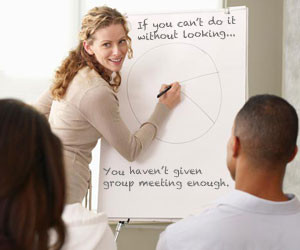Group Meeting: What’s the Point?
by
 In last week’s poll nearly 70% of readers felt that giving group meeting more than quarterly is a waste of time. While this certainly doesn’t sound like an extreme position to us, it’s clear that respondents’ answers were influenced by their definition of group meeting. If the goal of group meeting is to get help with the problems we’re facing in lab, then maybe monthly or even weekly informal meetings would make sense. Alternatively, if the purpose of group meeting is to practice giving formal seminars, then maybe giving two or three meetings a year is enough. So this got us thinking – What the heck is the point of group meeting anyway?
In last week’s poll nearly 70% of readers felt that giving group meeting more than quarterly is a waste of time. While this certainly doesn’t sound like an extreme position to us, it’s clear that respondents’ answers were influenced by their definition of group meeting. If the goal of group meeting is to get help with the problems we’re facing in lab, then maybe monthly or even weekly informal meetings would make sense. Alternatively, if the purpose of group meeting is to practice giving formal seminars, then maybe giving two or three meetings a year is enough. So this got us thinking – What the heck is the point of group meeting anyway?
Below we’ve listed several oft-cited reasons for holding group meeting. In the interest of brevity, “to loudly crunch potato chips or carrots in the ear of my neighbor” and “to sweat profusely in a closed room with my colleagues” have been omitted. By distilling group meeting to it’s essential components, we hope to provide a prioritized list of goals for researchers to focus on as we prepare for our next talk.
.
[poll id=”83″]
.
.
Any other important reasons to have group meeting?
.
.


linda
wrote on August 1, 2011 at 1:58 pm
Getting ready for group meeting forces me to take a hard look at what I have accomplished since the last one but more importantly, to summarize what has been done and interpret data as an aggregate. Too often I feel like things are not going well or avoid working up some data but then once I do it for group meeting, I realize, it wasn't so bad. Kind of like an adaptation of Dorothy Parker's quote, "I hate writing (overcoming experimental diffficulties, analyzing data) but love having written (discovering something new)"
alan@benchfly
wrote on August 1, 2011 at 2:16 pm
It's true- (begrudgingly) going through all of the data since the last group meeting can help shed light on where the project is and where it's going. It's easy to get stuck troubleshooting a single experiment and lose sight of the bigger picture and group meeting forces you to look at that.